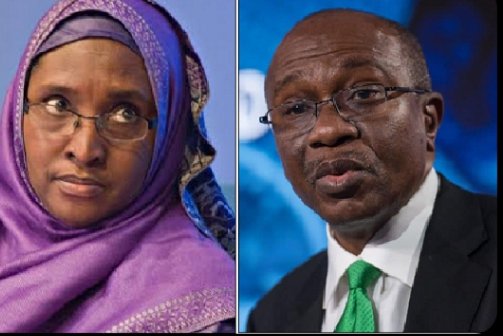
More Controversy Trails Naira Redesign Policy
The Evangelist
October 30, 2022
By Nduka CHIEJINA
•We have Buhari’s approval in writing, CBN insists •Moghalu backs policy, says it’ll reduce high inflation •Gumi blasts move as economic suicide that can’t stop kidnapping
The controversy provoked by the Central Bank of Nigeria’s plan to redesign the naira continued yesterday with an official response from the apex bank to the Minister of Finance, Budget and National Planning, Mrs Zainab Ahmed.
Ahmed had sparked controversy as a guest of the Senate Committee on Finance during the 2023 budget defence session on Friday when she declared that she had no knowledge of CBN’s decision to redesign the nation’s currency.
Ahmed had said: “Distinguished senators, we were not consulted at the Ministry of Finance by the CBN on the planned naira redesigning and cannot comment on it as regards merits or otherwise.”
Responding to the Finance Minister’s claim in an interactive session with some newsmen in Abuja on Friday night, CBN’s Director of Corporate Communications, Mr. Osita Nwasinobi, said the policy was approved by President Muhammadu Buhari in writing.
Nwanisobi said: “The CBN remains a very thorough institution that follows due process in its policy actions.
“The Management of the CBN, in line with provisions of section 2(b), section 18(a), and section 19(a)(b) of the CBN Act 2007, had duly sought and obtained the approval of President Muhammadu Buhari in writing to redesign, produce, release and circulate new series of N200, N500 and N1,000 banknotes.”
Giving further reasons why the decision was taken, Nwanisobi said that “currency management in the country had faced several escalating challenges which threatened the integrity of the currency, the CBN, and the country.”
He reminded the finance minister that “every top-rate Central Bank was committed to safeguarding the integrity of the local legal tender, the efficiency of its supply, as well as its efficacy in the conduct of monetary policy”.
On the timing of the redesign project, Nwanisobi explained that the CBN had “tarried too long considering that it had to wait 20 years to carry out a redesign, whereas the standard practice globally was for central banks to redesign, produce and circulate new local legal tender every five to eight years”.
Nwanisobi urged all Nigerians to support the currency redesign project, stressing that “it is in the overall interest of Nigerians”.
He reiterated that some persons were hoarding significant sums of bank notes outside the vaults of commercial banks; a trend he said should not be encouraged by anyone who means well for the country.
The CBN spokesman assured Nigerians that the currency redesign exercise was purely a central banking exercise and not targeted at any group.
Nwanisobi expressed optimism that the effort will, among other goals, deepen Nigeria’s push to entrench a cashless economy in the face of increased minting of the eNaira.
This, he said, is in addition “to helping to curb the incidents of terrorism and kidnapping due to access of persons to the large volume of money outside the banking system used as a source of funds for ransom payments”.
Nwanisobi therefore urged Nigerians, irrespective of their status, to support the Naira redesign project, as it is for the greater good of the economy.
He insisted that the Central Bank of Nigeria (CBN), in redesigning three series of the Naira, “followed the law and due process to carry out the exercise, which is 12 years due”.
Ex-CBN deputy governor, others back policy
Declaring his support for the redesigning of the naira yesterday, a former CBN deputy governor, Prof. Kingsley Moghalu, commended the apex bank for the move, saying it is capable of reducing high inflation.
The political economist, who gave the commendation in a statement he issued in Lagos, advocated a 90-day window for the policy’s implementation.
He said: “I fully support the Central Bank of Nigeria in redesigning the Naira. If 80 per cent of the bank notes in circulation are outside the banks, that is troubling.
“The CBN obviously wants to force all those notes back into the banking system. Those with the notes must surrender them to get new ones or else it becomes illegal tender after January 31, 2023.
“This is also a way to withdraw currency from circulation; an unorthodox way of tightening the money supply since the country is battling high inflation.
“The flip side is that people who are holding huge amounts of cash outside the banking system for nefarious reasons will go to the parallel forex market to buy hard currency, putting further downward pressure on the value of the Naira as too much Naira will be chasing too few dollars.”
The ex-CBN boss, however, expressed doubt that the step would solve inflation, “because there also are other major reasons for inflation such as the forex crisis, which this new move can exacerbate, as well as the impact of the security crisis on food price inflation.”
According to him, the step, however, has become necessary for national security but the window for implementation is too short.
“This will put a lot of operational pressure on commercial banks and the financial system in general.
“A 90-day window will have been better, but one can understand the need to avoid interfering with the elections.”
Also declaring support for CBN’s decision to redesign the naira, the CEO of BIC Consultancy Services and one time contributor to CBN’s Quality Assurance FSS 2020 project, Dr Boniface Chizea, said: “The CBN has the sole authority to issue legal tender currency in Nigeria. The bank alone is able to determine the quantum of currency to release as to align with other critical objectives, particularly macroeconomic stability.”
According to Chizea, “the CBN designs the face of the currency. This is one reason why the mint which prints currency is a department supervised by the Central Bank. I speak authoritatively here.”
Gumi rejects Naira redesign, says it’s economic suicide
On his part, popular Islamic cleric, Sheikh Ahmad Gumi, kicked against redesigning of the naira, describing it as economic suicide for Nigerians.
In a statement titled “Changing the Naira: This is no time for economic kamikaze!”, Gumi said any policy that would cause more cash crunch is a disaster for the nation.
He said the policy will not starve kidnappers of cash because they may decide to demand for dollars and other currencies to make life harder for the people.
“People that sell goods will tell you that most Nigerians don’t have the money to buy things; therefore most traders are running at a loss and are already folding up. At this juncture, anything that can cause more cash crunch will be a disaster for the nation.
“Many good ideas are marred by wrong timing. This is likely to be another one. No matter how ingenious the hatchers may romanticize, the benefit will remain phantom since the reality on the ground is incongruous and it spells doom for the escapade.
“Eighty per cent of Nigerians, especially rural people, depend on cash transactions. A sudden change to a cashless or cash-starved society will mean pauperizing them in a spate of a short time that could trigger – God Knows- an unprecedented socio-economic turmoil in this semi-skilled or unskilled population.
“This kind of programme is not for a government that is in the throes of its demise. If there is any advantage of such adventures, it usually comes after many years of excruciating poverty and hardship which no well-meaning government should hand over such cruelty to another incoming government to manage.
“Mopping the cash from the populace as it claims to swell commercial banks will give an unfair advantage to a few people that control the banks against the greater population. As for the North which is poorly represented in the banking system, it’s a sure economic suicide.
“How many Nigerians have access to banks? How many do have the privilege to enjoy the most simple of banking loans? You need to know someone to get a loan is no news. In such a Nigeria, with this tight control of cash flow, the nation is treading towards communism and dictatorship.
What we need is a free market-driven economy with minimal cash flow control. As for the question of starving kidnappers of Naira, it goes without saying that they will resort to Dollars and other hard currencies which will further put more pressure on it, making the rotten situation bad-der.
“Kidnapping can only be stopped by robust policing, social justice for all, and equitable wealth distribution. Any cosmetic measure will not stop it. May Allah open our eyes and prevent us from jumping from frying pan to fire. Amin.”










